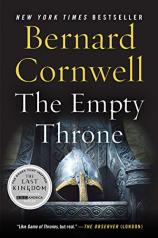The Empty Throne
Review
The Empty Throne
One of the underrated little tasks authors have to perform is to manipulate their characters. On the surface, it seems like an easy thing to do. The author gets to create the characters, construct the plot and generally has control over all the elements of the story. But it’s never quite that simple. It’s a fallacy to say that characters in a novel have a mind of their own, but strong, well-written characters do develop a personality of their own, and the author has to make their actions consistent with their personality. If you have a character who’s cowardly, depressive or antisocial, it’s going to be difficult to get them to the place where they rescue the kitten that’s stuck in the tree, or whatever it is you need them to do. This gets a good bit harder when you have a character who is very savvy and doesn’t like being manipulated by his fellow characters.
"Cornwell does his usual masterful job of putting Uhtred in harm’s way at the right time with the right strategy and then puts the reader in the shield wall next to him, watching the thrust of the long and short swords."
In THE EMPTY THRONE, Bernard Cornwell has to get his lead character to various locations in Central England, then over to Wales for a short trip, and back to England for the last few chapters and the battles that dominate the final pages. The difficulty he faces is that Uhtred, the doughty warrior of his Saxon books, has a great deal of experience in being manipulated. Uhtred spent the earlier volumes in the series being led this way and that by King Alfred. Now Alfred is dead, and the lord of the Mercians is dying, which gives Uhtred much more autonomy and responsibility.
These developments free Uhtred of the irksome task of keeping the nascent English state together, but Cornwell afflicts him with two additional problems. First, Uhtred was badly injured at the close of the last book, THE PAGAN LORD, and he begins THE EMPTY THRONE as a near-invalid. (In fact, Uhtred is so badly hurt that Cornwell hands the narration duties to his son for the first few chapters.) Second, Uhtred has to take on a new role as protector of the innocent by making sure that the young heirs to Mercia and Wessex are not victimized by treachery.
His relative weakness and political necessities require Uhtred to use his wits more than his sword in this entry of the series. This is mostly to the good, not least because it gives his son, young Uhtred, the chance for some martial glory. And after a long career of being tricked and bamboozled into fighting Alfred’s wars for him, it’s satisfying to see Uhtred plot and counterplot his way to success.
The difficulty with THE EMPTY THRONE is that it seems like something of a detour. There is a lengthy interruption in the middle of the novel that requires the usually cynical Uhtred to engage in some rank superstition --- although it turns out that the superstition is well-founded in a surprising way. The focus shifts halfway through from internal fighting among the lords of Wessex and Mercia to an external threat from Danish warriors who are leaving Ireland for greener pastures in England.
The new threat requires a smart war leader to counter it, one who can’t be manipulated. Cornwell does his usual masterful job of putting Uhtred in harm’s way at the right time with the right strategy and then puts the reader in the shield wall next to him, watching the thrust of the long and short swords. THE EMPTY THRONE is a satisfying addition to the tales of Uhtred, but it doesn’t seem to bring the saga any closer to its ultimate conclusion. This is good news in its way, as it means there will be more books and more battles to come. Hopefully, this epic series will reach an epic conclusion.
Reviewed by Curtis Edmonds on January 8, 2015
The Empty Throne
- Publication Date: January 5, 2016
- Genres: Adventure, Fiction, Historical Fiction
- Paperback: 320 pages
- Publisher: Harper Paperbacks
- ISBN-10: 0062250728
- ISBN-13: 9780062250728





